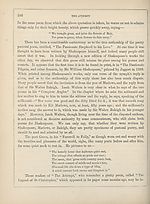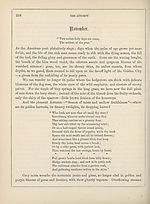Attempt > Volume 1 and Select writings
(259) Page 247
Download files
Complete book:
Individual page:
Thumbnail gallery: Grid view | List view

THE ATTEMPT
247
terested in hearing that there is an old poem on the same legend hy Warner, who
lived in the reign of which we are speaking. It is in different verse, and takes up the
legend at an earlier date than the writer in this Magazine does; hut, on the other
hand, it does not give its beautiful termination—that of carrying the child Christ
across the “angry tide.” Warner, after telling us how there was a “man of stature
big,” who was determined to have for his master one in whom there was no sort of
fear, tells of his first serving a great emperor, till, on discovering that his master
feared the devil, he quitted his service for that of the latter; lastly, on finding that
even this master trembled on beholding a cross, he bids the devil serve himself, de¬
termining to seek that Christ before whom even the devil trembles ; and then he
hastens to a hermit to learn from him how this great master may be served; and here
it is that the writer in this Magazine so well narrates the legend, but Warner tells us
merely that the hermit “ gave directions sound,” as to how Christ was to be served
by “ faith and works of alms ”—
“ Then he, that scorned his service late,
To greatest potentates,
E’en at a common ferry, now,
To carry all awaits.”
One of the most beautiful odes which has ever been ascribed to Shakespeare, is
claimed by many for a poet, named Richard Barnfield, of whom little is known; but,
if he be indeed the writer of the following lines, he deserves to be had in remembrance,
if only for this one ode. It is the well-known and beautiful poem, beginning—
“ As it fell upon a day,
In the merry month of May,
Sitting in a pleasant shade,
Which a grove of myrtles made.”
We feel inclined to run on with the quotation, which is truly musical and poetical,
but our readers are probably well acquainted with it already. It will be observed that
we have not attempted to add our feeble praise to the memory of Shakespeare, or
Spenser; no one requires to be reminded of them—they will live with us for ever—a
glorious possession for every Biiton. There are beauties to be found in many other
writers of this reign, such as Sir Philip Sidney, Wotton, and Ben Jonson; but we
must draw to a close our mention of them, and hope, in a future number, to say
something of their successors.
des Eaux.
247
terested in hearing that there is an old poem on the same legend hy Warner, who
lived in the reign of which we are speaking. It is in different verse, and takes up the
legend at an earlier date than the writer in this Magazine does; hut, on the other
hand, it does not give its beautiful termination—that of carrying the child Christ
across the “angry tide.” Warner, after telling us how there was a “man of stature
big,” who was determined to have for his master one in whom there was no sort of
fear, tells of his first serving a great emperor, till, on discovering that his master
feared the devil, he quitted his service for that of the latter; lastly, on finding that
even this master trembled on beholding a cross, he bids the devil serve himself, de¬
termining to seek that Christ before whom even the devil trembles ; and then he
hastens to a hermit to learn from him how this great master may be served; and here
it is that the writer in this Magazine so well narrates the legend, but Warner tells us
merely that the hermit “ gave directions sound,” as to how Christ was to be served
by “ faith and works of alms ”—
“ Then he, that scorned his service late,
To greatest potentates,
E’en at a common ferry, now,
To carry all awaits.”
One of the most beautiful odes which has ever been ascribed to Shakespeare, is
claimed by many for a poet, named Richard Barnfield, of whom little is known; but,
if he be indeed the writer of the following lines, he deserves to be had in remembrance,
if only for this one ode. It is the well-known and beautiful poem, beginning—
“ As it fell upon a day,
In the merry month of May,
Sitting in a pleasant shade,
Which a grove of myrtles made.”
We feel inclined to run on with the quotation, which is truly musical and poetical,
but our readers are probably well acquainted with it already. It will be observed that
we have not attempted to add our feeble praise to the memory of Shakespeare, or
Spenser; no one requires to be reminded of them—they will live with us for ever—a
glorious possession for every Biiton. There are beauties to be found in many other
writers of this reign, such as Sir Philip Sidney, Wotton, and Ben Jonson; but we
must draw to a close our mention of them, and hope, in a future number, to say
something of their successors.
des Eaux.
Set display mode to: Large image | Transcription
Images and transcriptions on this page, including medium image downloads, may be used under the Creative Commons Attribution 4.0 International Licence unless otherwise stated. ![]()
| Ladies' Edinburgh Debating Society publications > Attempt > Volume 1 and Select writings > (259) Page 247 |
|---|
| Permanent URL | https://digital.nls.uk/109868062 |
|---|
| Attribution and copyright: |
|
|---|

